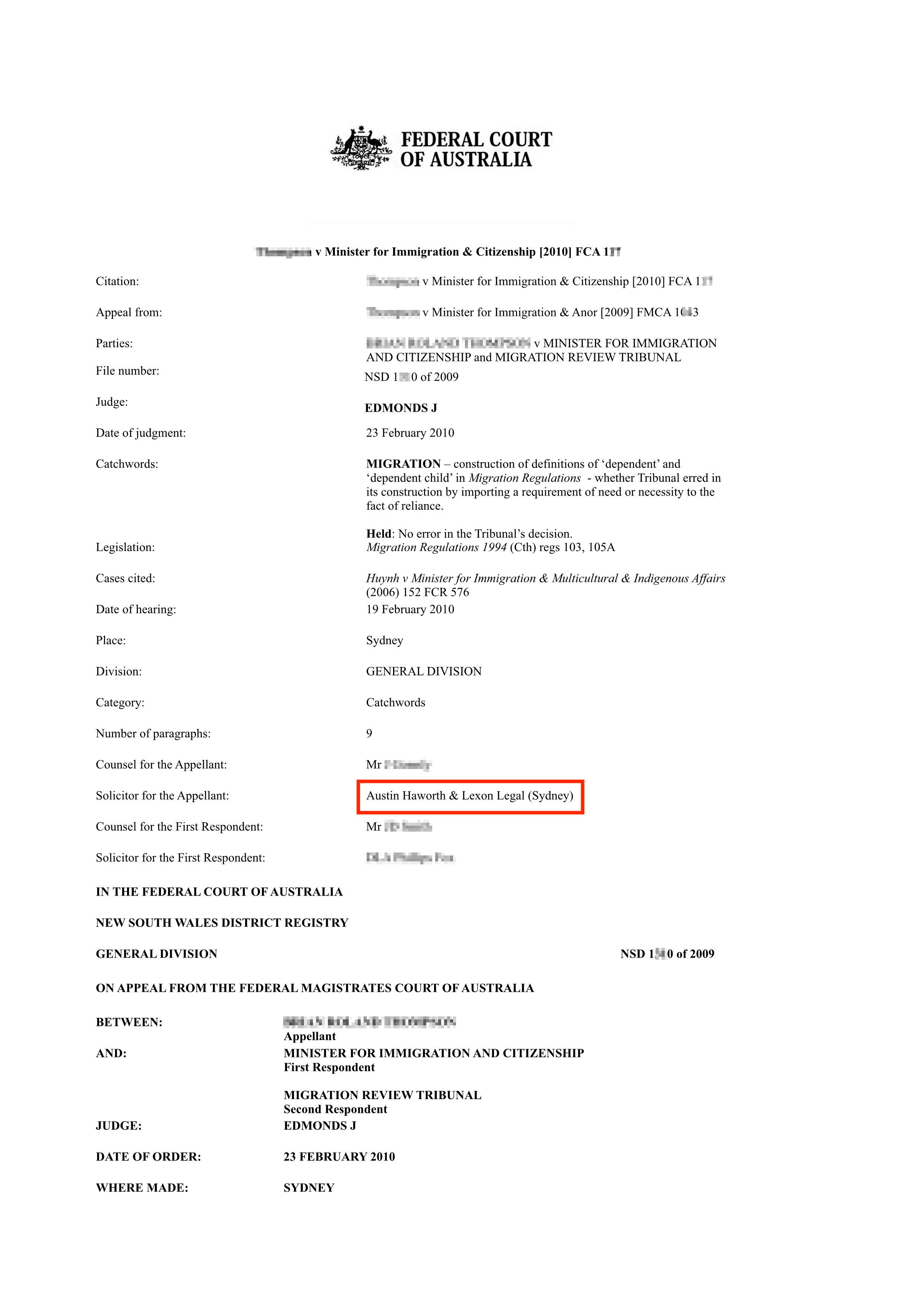【海量案例】ThXXXXon v Minister for Immigration & Citizenship [2010] FCA 1XX

IN THE FEDERAL COURT OF AUSTRALIA
NEW SOUTH WALES DISTRICT REGISTRY
GENERAL DIVISION
NSD 1XX0 of 2009
ON APPEAL FROM THE FEDERAL MAGISTRATES COURT OF AUSTRALIA
BETWEEN:
BXXXN ROXXND THXXXXON
Appellant
AND:
MINISTER FOR IMMIGRATION AND CITIZENSHIP
First Respondent
MIGRATION REVIEW TRIBUNAL
Second Respondent
JUDGE:
EDMONDS J
DATE OF ORDER:
23 FEBRUARY 2010
WHERE MADE:
SYDNEY
THE COURT ORDERS THAT:
The appeal be dismissed.
The appellant pay the first respondent’s costs.
Note: Settlement and entry of orders is dealt with in Order 36 of the Federal Court Rules.
The text of entered orders can be located using Federal Law Search on the Court’s website.
IN THE FEDERAL COURT OF AUSTRALIA
NEW SOUTH WALES DISTRICT REGISTRY
GENERAL DIVISION
NSD 1XX0 of 2009
ON APPEAL FROM THE FEDERAL MAGISTRATES COURT OF AUSTRALIA
BETWEEN:
BXXXN ROXXND THXXXXON
Appellant
AND:
MINISTER FOR IMMIGRATION AND CITIZENSHIP
First Respondent
MIGRATION REVIEW TRIBUNAL
Second Respondent
JUDGE:
EDMONDS J
DATE:
23 FEBRUARY 2010
PLACE:
SYDNEY
REASONS FOR JUDGMENT
This is an appeal from the Federal Magistrates Court (Scarlett FM): ThXXXXon v Minister for Immigration & Anor [2009] FMCA 1043, dismissing an application for review of a decision of the second respondent (‘the Tribunal’) affirming a decision of a delegate of the first respondent (‘the Minister’) to refuse to grant the visa applicant an Extended Eligibility (Temporary) (Class TK) visa.
ISSUE
The issue on this appeal is whether his Honour was correct in concluding that the Tribunal made no error in its construction of the definitions of ‘dependent’ and ‘dependent child’ in regs 1.05A and 1.03 of the Migration Regulations 1994 (Cth) (‘Regulations’) and in its application of that construction to the facts before it.
FEDERAL MAGISTRATES COURT
His Honour at [45] of his reasons referred to the decision of the Full Court in Huynh v Minister for Immigration & Multicultural & Indigenous Affairs [2006] FCAFC 122; (2006) 152 FCR 576 which, he observed, made it clear that the relevant words of the Regulations do not carry with them any implication that there is a need or necessity for the parent to provide the child with financial support in order for the child to be a ‘dependent child’ within the meaning of the Regulations. What is necessary to be shown is that the child is in fact reliant on the parent for financial support for his or her basic needs: Lander and Rares JJ at [33], [43] and [44]; Besanko J at [47], [53].
THE APPEAL IN THIS COURT
The appellant’s appeal in this Court was grounded on the basis that, contrary to Huynh, the Tribunal erred by importing a requirement of necessity into the meaning of ‘dependent’, and that his Honour erred in not identifying this error. In his written submissions, the appellant described the Tribunal’s alleged erroneous approach in the following way:
‘What the Tribunal did in considering “dependence” and “reliance” was to look to the need of the visa applicant after it found she had been earning a salary. The basic finding of the Tribunal that the financial support did not “cover” the daughter’s expenses was a deduction from premises that:
• the daughter was in receipt of employment income;
There was no acceptable evidence the daughter’s expenses exceeded her employment income such to require further financial support to “cover” her expenses.’
One only has to read [65] and [66] of the Tribunal’s reasons to conclude that the Tribunal did not do anything of the kind alleged by the appellant:
’65. The Tribunal acknowledges that the mere fact of the visa applicant’s employment does not preclude her from being dependent on her mother. The Tribunal has considered the evidence relating to the regular transfers from the review applicant or his spouse to the visa applicant. The Tribunal accepts that the review applicant and his spouse had been sending between $800 and $1100 a month for the visa applicant’s expenses and the Tribunal also accepts that this amount was considerably greater than the amount of the visa applicant’s income from her employment. However, the issue before the Tribunal is not merely whether the support the visa applicant receives from her mother is greater than the support she has from other sources. Rather, the issue is whether the visa applicant is wholly or substantially reliant on her mother for her basic needs for food shelter and clothing. While the review applicant argues that the money sent to the visa applicant covers her rent, food and clothes, there is no probative evidence before the Tribunal that this is so. The visa applicant and Ms GX had indicated that the visa applicant pays RMB 1000 a month in rent and RMB 1500 for other expenses but no probative documentary evidence has been provided to the Tribunal in support of these claims. The Tribunal is not satisfied that the visa applicant and the review applicant have been truthful in their evidence to the Tribunal and the Tribunal does not accept their assertion that the funds transferred by the review applicant or Ms GX covered the visa applicant’s rent, clothing and food. There is little other probative evidence before the Tribunal concerning the nature of the visa applicant’s dependency on her mother.
66. The Tribunal is not satisfied, on the limited evidence before it, that the visa applicant was wholly or substantially reliant on her mother for financial support to meet her basic needs for food, shelter and clothing either at the time of the application or for a substantial period before that time. It follows that the Tribunal is not satisfied that the visa applicant was, at the time of the application, a dependent child of her mother, the visa-holding parent. The Tribunal is not satisfied that the applicant meets cl. 445.211(a) and cl. 425.211.’ (Emphasis added)
Far from importing a requirement of need or necessity into the meaning of ‘dependent’, the first sentence of [65] is an acknowledgment that, consistent with Huynh, the appellant’s need or necessity has nothing to do with the question of whether the visa applicant is dependent on her mother. The only issue addressed by the Tribunal was whether she was in fact reliant on the parents for financial support for her basic needs and the Tribunal was not satisfied, on the limited evidence before it, that she was so reliant. There is no error, on the part of the Tribunal, in that approach and its lack of satisfaction was undoubtedly open on the evidence before it.
Counsel for the appellant sought to make something of the use of the word ‘covers’ in the sentence :
‘While the review applicant argues that the money sent to the visa applicant covers her rent, food and clothes ...’
and the word ‘covered’ in the sentence:
‘[T]he Tribunal does not accept their assertion that the funds transferred by the review applicant or Ms GX covered the visa applicant’s rent, clothing and food.’
But, in that context, neither means any more than ‘was applied for’/‘were applied for’.
His Honour was correct in concluding that there was no error in the Tribunal’s approach or in its conclusion.
The appeal must be dismissed with costs.
I certify that the preceding nine (9) numbered paragraphs are a true copy of the Reasons for Judgment herein of the Honourable Justice Edmonds.
Associate:
Dated: 23 February 2010



 1300 91 66 77
1300 91 66 77







 首页
首页


